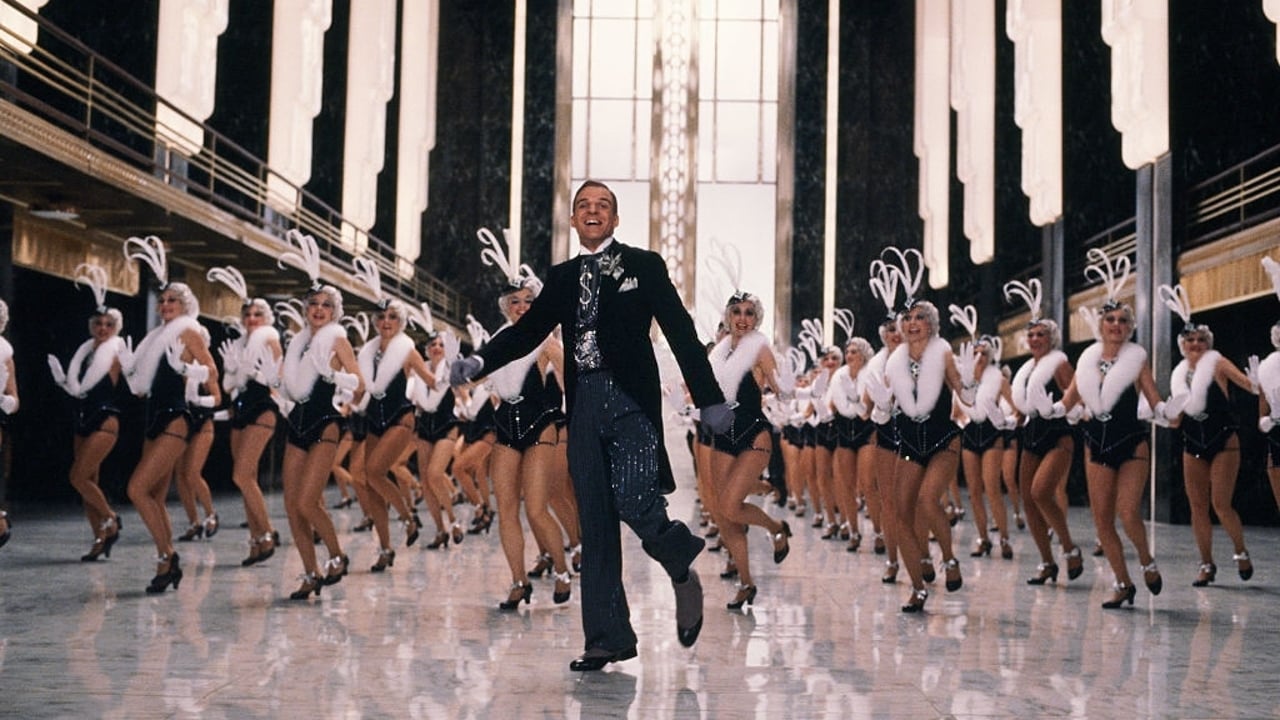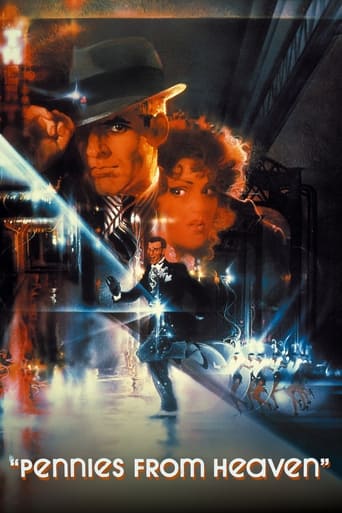

Most undeservingly overhyped movie of all time??
... View MoreBest movie of this year hands down!
... View MoreIt's a mild crowd pleaser for people who are exhausted by blockbusters.
... View MoreBlistering performances.
... View MoreI normally see Steve Martin involved with rather goofy movies like 'Father of the Bride', 'Looney Tunes:Back in Action' or 'The Three Amigos' but I hadn't seen him before in more serious roles as this! The music was quite good but was rather disappointed. Since this is suppose to be a musical, they just lip synced the old songs then use their original voice. Sure Steve Martin has a good voice like why hide it, yknow?The choreography was brilliant, every single actor danced so brilliantly that I forgot they were actors, lol! I thought the storyline was really good but depressing. Steve Martin's character should've left his wife for the ex school teacher. The amount of love they had for each other was great, they needed to run away and not come back! It's too bad they didn't do it from the beginning and that way, things will be better for the couple! It's not a great movie but it's good enough. I give this 8/10!
... View MoreAlthough the movie as a whole doesn't quite come together, PENNIES FROM HEAVEN (1981) is a unique film with a lot to like about it. It's a Depression-era period piece, which is cool. Steve Martin plays a struggling sheet music peddler. Bright and happy fantasy musical numbers are juxtaposed with the harsh realities of the Depression, highlighting the escapist value of music and movies.I love how the vintage 1930s recordings are used in the musical numbers, with the actors lip-synching to wonderful effect. It often gives the sequences a comedic edge. The larger-than-life fantasy numbers are inspired, one would assume, by Busby Berkeley's choreography in the 1930s Warner Bros. "Gold Diggers" films. And there's a great scene where Steve Martin and Bernadette Peters dance in-sync with Fred and Ginger in a scene from FOLLOW THE FLEET (1936).Steve Martin's character is a cad, but he almost makes you sympathize with him. Almost. And then his true colors shine through. Bernadette Peters is adorable in a challenging, heartbreaking role. Christopher Walken has one dynamite scene where he tap dances in a bar room.PENNIES FROM HEAVEN is not a comedy, as one might expect. It's dark, depressing, tragic, vulgar. But it is buoyed by fantastically upbeat musical numbers. It's a strange and intriguing mix. Ultimately the film is a cynical look at life. Just when you think things are bad enough for Martin's character, life gets even worse in the final act. All the while the troubles of reality are swept under the glittery musical fantasies, a sort of defense mechanism for the characters. Life should be like the songs, Martin thinks. But the film makes it clear that life is not.The movie has a lot going for it. The musical numbers are impressive, the vintage tunes are great, Peters and Walken in particular give standout performances, and director Herbert Ross stylishly quotes famous urban paintings like Edward Hopper's "Nighthawks". It's a flawed film in many ways, but there's plenty for viewers to grab onto, particularly if they're fans of the 1930s era.
... View MoreHeavy-going, off-putting Depression-era musical (set to old recordings of the 1930s) is quite elaborate and usually looks good, but is filled with ciphers. Steve Martin, in a fair dramatic acting turn, plays a sex-obsessed sheet-music salesman in Chicago with no conscience who cheats on his frigid wife with a schoolteacher, later becoming involved in a murder investigation. Unfortunately for Martin, this character is such a crude, lascivious lout, we don't really care about his fate or whether or not his teacher-girlfriend (now a prostitute) leaves him. Jessica Harper (as the cold-fish wife) is every married man's nightmare: the bride-turned-shrew; Bernadette Peters is somewhat more sympathetic as the lover, and gets to utilize her natural Kewpie doll-ness to fantastic effect in the musical numbers. But, for the most part, "Pennies From Heaven" is peopled with low-lifes. The extravagant showstoppers, fantasy sequences designed like mini Busby Berkeley movies, are breathlessly intricate and exciting to watch, but they provide little emotional subtext for what's happening in the real world (I don't know if original creator Dennis Potter meant it or not, but the material plays like "Up the Sandbox" with music). Herbert Ross directed with a heavy hand, though he does get some fine moments from his cast, especially Christopher Walken as a hoofing pimp. An expensive remake of a British mini-series starring Bob Hoskins, the movie ultimately feels a bit claustrophobic and sluggish, and has an unsatisfying wrap-up to its reedy-thin plot. **1/2 from ****
... View MoreI recall when this came out, the reviews stated and restated that this experimental movie was not an easy viewing, but after more than 25 years, it still took me a few numbers to adjust to the weird concept and to the grim plot. I can't say this movie doesn't have major problems but... wow. The numbers are cut against the bleakest storyline ever in a musical, with unflinching darkness highlighted. It confronts the usual jaded viewpoint and problematics of the 1970-80s musical from as the others of the time do (All that Jazz, One from the Heart and at that point the play Chicago) but also Singin in the Rain gets eyed for some influence.I don't mind that this is a dark trip with lowlifes and losers, but I don't understand it's larger point. The idea that the songs allow escape for the character just doesn't seem good enough for an experimental work. After the treat of each number, a viewer has to take the bitter medicine of the storyline.Another problem is the insertion of the numbers, which as they have for two previous 2 decades, suffer from unsuredness over which part of a script they replace (monologue, dialog, thoughts, dreams/fantasies, narration, plot summaries, etc) which had become the chief problem of the genre. (i.e. Attempting to address the usual complaint of unreality musicals, in "On a Clear Day you Can See Forever" some songs are only heard as the internal thoughts of Daisy. Nothing on the screen even suggests a musical number. Lips don't even mouth the lyrics. & Cabaret only allows it's numbers to be performed in a nightclub. etc.) Less satisfying: 1) Why do the characters look through the 4th wall at the camera in the musical numbers?, ...and 2) Why do women's voices come out of mens mouths and vice-versa?But in constructing this pastiche, many participants hidden expertise' are awesomely revealed. Danny Daniels choreography is routinely excellent. Steve Martins dancing is very precise. It's inconceivable that he hadn't danced before. The dance numbers had the real potential of being junky, simplified versions of the old ones. But the creators have rigorously studied what was good about the source movies fifty years earlier, and these hold their own; some of the most joyful production numbers ever put on film. Some numbers feature seemingly endless rows of dancers, all in perfect precision. It's a fr**king joy to behold. This must have taken enormous planning. The numbers "Yes, yes" "Love is good for anything that ails you" are just unbelievably jubilant.Steve Martin is really handsome here. He's convicning as both a heel and a debonaire. In his 2nd film he's already showing more range than, say the pathetic Mike Myers, who turns every character into another opportunity to do a "funny" (unfunny) Scottish accent. Making matters worse for Myers is that on his new press junket for Shrek 3 he's clearly contracted some disease where he can't stop being entertaining. Each new feeble attempt at humor makes you clench your butt. It's really creepy. Donald O'Connor was the last to contract this. Both are unbearable.
... View More